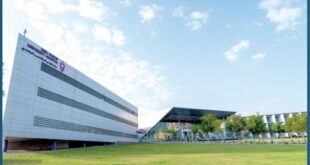Charlotte Wakeham, head of future talent at Royal Mail, explains what worries and excites her about the future of HR, in this exclusive interview with HR magazine.
Charlotte Wakeham is rewriting Royal Mail’s early careers and apprenticeship strategy, revitalising its graduate programme and looking to the future of skills and talent in the company. But she didn’t start out this way.
“I joined Royal Mail straight out of college as a ‘postie’, out on delivery for my local office,” says Wakeham. “After 18 months, I had the opportunity to cover a period of maternity leave as an HR coordinator. I have never looked back.”
Read more: The future looks squiggly
Wakeham’s 12-year career has been spent entirely at Royal Mail. She sees it as a unique opportunity to have many HR careers, due to the scale of the HR team, which has more than 600 colleagues, including internal payroll, pensions, a huge business partnering function and a talent team.
She says: “Discovering the breadth of the HR function enabled me to understand my strengths, my passion for enabling others and made me realise that if I knew about this profession sooner, I absolutely would have tailored my education in this direction.”
It is not only the breadth of HR that fascinates Wakeham but its potential to make or break the future of work, particularly in enabling ethical automation.
“New technology means that jobs could look very different in the future, so there’s a bigger role for HR in identifying what kind of skills and roles the organisations will need,” she says, adding that HR should try to track where tech is evolving, and ask what the technology aims of the organisation are.
“What skills will that technology replace, and what skills will be required to manage it, or work alongside it?” she suggests asking.
Having won last year’s HR Excellence Future Leader Award, Wakeham is clearly on her way to shaping HR’s future. However, even influential practitioners cannot singlehandedly tackle every hurdle.
Wakeham expects debates around flexible work to rage on for decades.
She says: “The world of work is evolving so much, and we know that people can be productive at home or with shorter weeks. But we also know that there’s no one-size-fits-all solution when it comes to flexible working because everyone has different preferences and roles have different needs.
“As skills change and tech changes, more roles could done remotely, or human skills may be really needed in person.”
Read more: Future leader: Robyn Le Gallais
Wakeham is also concerned about how HR will handle an increasingly multigenerational workforce: “Research demonstrates that different generations have different drivers and values. However, effective management of a generationally diverse team will enable a vast range of ideas and allow everyone to learn from each other.”
In Wakeham’s own career, she has focused on uniting colleagues at different levels. Under her initiative, all apprentices get a mentor (“someone a bit further on in their career”) and a buddy, who has previously completed the same programme.
“We also prepare line managers to understand how best to introduce apprentices into the team, and what the purpose of their role is,” she adds. “We see that colleagues really want to share knowledge and learn from each other through this.”
Another initiative she has been involved in was around providing interview questions in advance when recruiting to Royal Mail. This practice, which was trialled in Wakeham’s department, has now been rolled out across the whole business.
“We don’t want interviews to be a memory test, or to put people on the spot. This has removed a barrier for so many people joining us,” she says. “We’ve also found that interviewers can ask better and more thoughtful questions this way. We want to set people up for success and bring their best examples to us. This fundamental change definitely helps.”
Source link


